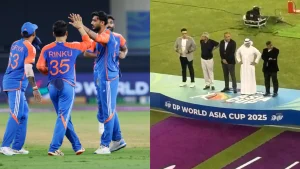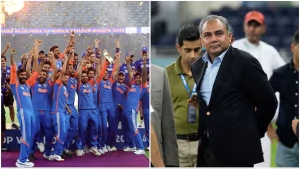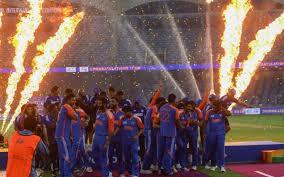Dubai, UAE – In an unprecedented move that has sent shockwaves through the cricket world, India refuse Asia Cup trophy collection during Sunday’s chaotic presentation ceremony in Dubai. The defending champions followed through on their earlier threat to boycott any award presentation involving Pakistan Cricket Board chairman Mohsin Naqvi, who also serves as Asian Cricket Council chief.
The decision to India refuse Asia Cup trophy created one of the most controversial moments in cricket history, as the champions declined to accept their rightful award from the very organization that governs Asian cricket. This dramatic stand represents a significant escalation in India-Pakistan cricket tensions.
Hour-Long Delay and Crowd Unrest

The ceremony preceding the moment when India refuse Asia Cup trophy was marked by chaos and delays. Pakistan’s team initially refused to leave their dressing room following their defeat, causing a delay of almost an hour before the presentation could begin. The Pakistani team’s reluctance to participate created additional tension before the main controversy unfolded.
When Naqvi finally appeared on stage, Indian spectators erupted with loud boos and chants of “Bharat Mata ki Jai,” creating a hostile atmosphere that foreshadowed the decision to India refuse Asia Cup trophy. The crowd’s reaction demonstrated widespread support for the team’s controversial stance.
Prior Warning and Strategic Decision
The decision to India refuse Asia Cup trophy was not spontaneous but stemmed from earlier tensions during the tournament. Following the September 14 group-stage match between India and Pakistan, which was marred by the no-handshake controversy, reports revealed that India had decided they would not share the presentation stage with Naqvi if they retained the crown.
This predetermined stance to India refuse Asia Cup trophy shows the team’s commitment to their principles, even at the cost of missing their moment of glory. The defending champions prioritized their political stance over traditional ceremonial protocols.
Abrupt Ceremony Conclusion

The moment when India refuse Asia Cup trophy became official was announced by broadcaster Simon Doull, who read an Asian Cricket Council statement. After individual awards were presented to players like Tilak Varma (Player of the Match), Kuldeep Yadav, and Shivam Dube, the ceremony took an unexpected turn.
“Ladies and gentlemen, I have been informed by the Asian Cricket Council that the Indian cricket team will not be collecting their awards tonight. So that does conclude the post-match presentation,” Doull announced, confirming the decision to India refuse Asia Cup trophy.
Behind-the-Scenes Negotiations and Tensions
The controversy surrounding the decision to India refuse Asia Cup trophy involved complex behind-the-scenes negotiations. Indian team management had reportedly asked who would present the winners’ trophy, leaving the ACC scrambling when they realized their own chief was unacceptable to the champions.
When Naqvi took the dais, he was informed that Indian players would not accept the trophy if he attempted to present it, and that an official protest would follow. The decision to India refuse Asia Cup trophy was communicated directly to the ceremony organizers.
Trophy’s Quiet Departure


In a surreal turn of events following the announcement that India refuse Asia Cup trophy, an organizer quietly carried the trophy away from the stage and into the Indian dressing room. This symbolic gesture demonstrated that while the team refused the public presentation, they still claimed their rightful prize.
The image of the trophy being discretely removed after India refuse Asia Cup trophy became public encapsulates the awkwardness and unprecedented nature of the situation.
Pakistan Team’s Reaction and Additional Drama
The chaos wasn’t limited to the decision to India refuse Asia Cup trophy. Pakistan captain Salman Agha reportedly threw away the runners-up cheque in front of Naqvi, adding another layer of drama to an already contentious ceremony. The Pakistani team’s own protest behavior complemented India’s trophy refusal.
Pakistan players emerged from the dressing room to loud boos, some still wearing flip-flops, highlighting the disorganized nature of the entire event surrounding the decision to India refuse Asia Cup trophy.
Individual Awards and Recognition
Despite the decision to India refuse Asia Cup trophy as a team, individual Indian players still received their personal accolades. Tilak Varma collected his Player of the Match award for his unbeaten 69 off 53 balls, while Abhishek Sharma received the Player of the Tournament award for his outstanding Asia Cup campaign.
These individual recognitions created an interesting contrast to the team’s collective decision to India refuse Asia Cup trophy, showing that personal achievements could be separated from the political protest.
Diplomatic and Cricket Implications
The unprecedented decision to India refuse Asia Cup trophy raises serious questions about the future of India-Pakistan cricket relations and the role of politics in sports. This bold stand by the defending champions sets a new precedent for how teams might respond to perceived political provocations.
The long-term implications of the decision to India refuse Asia Cup trophy will likely influence future tournament organization, ceremony protocols, and the delicate balance between sporting achievement and political considerations in cricket’s most contentious rivalry.

